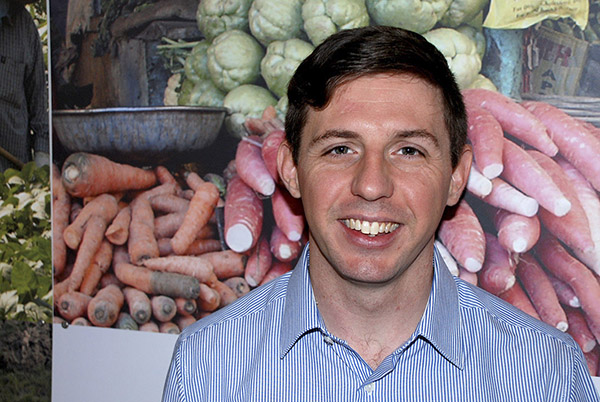Dr Daniel P Bray

Agriculture, Health and Environment Department
Natural Resources Institute, Faculty of Engineering & Science+44 (0)1634 88 3729
Daniel Bray joined NRI in January 2016, moving from the Chemical Ecology Group at the Swedish University of Agricultural Sciences.
Daniel graduated from the University of Nottingham in 2000 with a first class degree in Biological Science and worked for the Open University while still an undergraduate. He then went on to complete a PhD in 2004 on host-parasite interactions in shrews, supervised by Prof. Paula Stockley at the University of Liverpool. For almost ten years, he worked with Prof. Gordon Hamilton at Keele University and Prof. Reginaldo Brazil at FIOCRUZ on the chemical ecology of sand flies, conducting extensive field work in Brazil. He also worked briefly with Prof. Jenny Mordue at the University of Aberdeen on a projecting targeting sea lice parasites of salmon. During this period he also completed a Medici Business Fellowship.
In 2013 Daniel was awarded a Senior Visiting Fellowship by the DAAD to conduct a project on aquaculture with Dr Joanna Miest at GEOMAR in Germany. In 2014 he was awarded an EU Marie Curie Fellowship to work with Prof. Rickard Ignell at SLU (Sweden) targeting biting midge vectors of agricultural diseases.
Daniel's main interest lies in understanding and exploiting chemical ecology to protect crops and improve animal and human health. In addition, he is also exploring how chemical ecology can be used to detect and prevent disease in aquaculture. Daniel is also an expert statistician, and regularly conducts data analysis consultancy for agricultural companies.
Daniel's primary interest is to develop new ways to protect crops, animals and people from pest insects and disease vectors. Much of this work is conducted alongside the UK horticultural industry, with Prof David Hall at NRI and Michelle Fountain and colleagues at NIAB-EMR. He is also interested in how the same techniques can be applied to improve security worldwide, and has conducted fieldwork in Brazil and Bangladesh.
His approach centres on identifying chemicals that provoke a behavioural response in the target species, which can be formulated as attractive lures or repellents. His work encompasses physiological techniques including electroantennography and single sensillum recording, laboratory bioassays on target species, and field testing and formulation of novel attractants and repellents. Working with Prof. Gordon Hamilton at Keele University, Daniel developed and tested a novel pheromone based tool for controlling Lutzomyia longipalpis, the sand fly vector of visceral leishmaniasis in Brazil. During his Marie Curie Fellowship at the Swedish Agricultural University (SLU), he worked with Prof Rickard Ignell and colleagues to test new repellents and attractants to protect livestock from biting midges.
Daniel is also very interested in how this same approach could be applied in an aquatic setting. At the University of Aberdeen he was involved in identifying chemicals which could be used to attract the sea louse Lepeophtheirus salmonis. These small crustaceans are parasites of salmon, and cause major economic losses in farmed fish. More recently, he has been working with colleagues at the University of Greenwich to develop a novel application of chemical ecology to detected disease in aquaculture.
Current research projects
Development of a pheromone-based monitoring system for a newly identified Contarinia midge on the Canadian Prairies (2017-2020) Canadian Agricultural Research Program
Exploitation of Interspecific Signals to Deter Oviposition by Spotted-Wing Drosophila (2019-2022) BBSRC Industrial Partnership Award with NIAB-EMR.
Auto-Dissemination of entomopathogenic fungi for sustainable control of spotted wing drosophila (2018-2021) Innovate UK with NIAB-EMR.
Oviposition behaviour of Aedes aegypti (DTA PhD studentship)
Push-pull against spotted wing drosophila (BBSRC-CTP studentship with NIAB-EMR)
Control of red poultry mite (British Egg Marketing Board PhD studentship)
Previous research projects
Development of a monitoring and mass trapping trap against pepper weevil (2017-2018) Innovate Wales
MIDGETRAP-An innovative semiochemical based tool for monitoring and control of biting midge vectors of bluetongue and Schmallenberg disease. (2014) EU Intra-European Fellowship for career development, SLU Sweden
Reducing the impact of disease on the sustainability of international aquaculture through an innovative odour-based detection system. (2013). Senior visiting fellowship, DAAD, Germany
Field trials of synthetic sex pheromone to reduce visceral leishmaniasis transmission by Lutzomyia longipalpis in Brazil. (2005-2015), PI Gordon Hamilton, Welcome Trust, Keele University.
- Athanassiou, Christos, Bray, Daniel P., Hall, David R, Phillips, Charles and Vassilakos, Thomas N. (2018) Factors affecting field performance of pheromone traps for tobacco beetle, Lasioderma serricorne and tobacco moth, Ephestia elutella. Journal of Pest Science, 91 (4). pp. 1381-1391. ISSN 1612-4758 (Print), 1612-4766 (Online) (doi:https://doi.org/10.1007/s10340-018-0987-8)
- Isberg, Elin, Bray, Daniel Peter, Hillbur, Ylva and Ignell, Rickard (2017) Evaluation of host-derived volatiles for trapping Culicoides biting midges (Diptera: Ceratopogonidae). Journal of Chemical Ecology, 43 (7). pp. 662-669. ISSN 0098-0331 (Print), 1573-1561 (Online) (doi:https://doi.org/10.1007/s10886-017-0860-x)
- Courtenay, O., Dilger, E., Carter, V., Bray, D., Bell, M., Gonzalez de Heredia, M., Borges-Alves, G., Nunes, C., Brazil, R. and Hamilton, G. (2017) Cluster randomised trial and development of a sandfly sex pheromone lure to reduce Leishmania infantum infection. Tropical Medicine & International Health, 22 (S1). p. 66. ISSN 1360-2276 (Print), 1365-3156 (Online) (doi:https://doi.org/10.1111/tmi.12978)
- Isberg, Elin, Bray, Daniel Peter, Birgersson, Göran, Hillbur, Ylva and Ignell, Rickard (2016) Identification of cattle-derived volatiles that modulate the behavioral response of the biting midge culicoides nubeculosus. Journal of Chemical Ecology, 42 (1). pp. 24-32. ISSN 0098-0331 (Print), 1573-1561 (Online) (doi:https://doi.org/10.1007/s10886-015-0663-x)
- Pimenta, Paulo Filemon, Bray, Daniel P., Carter, Vicky, Alves, Graziella B., Brazil, Reginaldo P., Bandi, Krishna K. and Hamilton, James G. C. (2014) Synthetic sex pheromone in a long-lasting lure attracts the visceral leishmaniasis vector, lutzomyia longipalpis, for up to 12 weeks in Brazil. PLoS Neglected Tropical Diseases, 8 (3):e2723. ISSN 1935-2727 (Print), 1935-2735 (Online) (doi:https://doi.org/10.1371/journal.pntd.0002723)
- Pimenta, Paulo Filemon, Bray, Daniel P., Yaman, Khatijah, Underhill, Beryl A., Mitchell, Fraser, Carter, Victoria and Hamilton, James G. C. (2014) Multi-modal analysis of courtship behaviour in the old world Leishmaniasis Vector Phlebotomus argentipes. PLoS Neglected Tropical Diseases, 8 (12):e3316. ISSN 1935-2735 (Print), 1935-2735 (Online) (doi:https://doi.org/10.1371/journal.pntd.0003316

